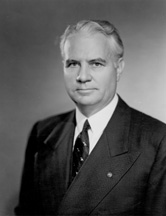
Back تعديل بريكر Arabic Amendo de Bricker Esperanto Enmienda Bricker Spanish Amendement Bricker French Emendamento de Bricker Interlingua Emendament de Bricker Interlingue Amendo di Bricker IO Bricker-frumvarpið Icelandic Konstitutional chanjo de Bricker NOV

The Bricker Amendment is the collective name of a number of slightly different proposed amendments to the United States Constitution considered by the United States Senate in the 1950s. None of these amendments ever passed Congress. Each of them would require explicit congressional approval, especially for executive agreements that did not require the Senate's two-thirds approval for treaty. They are named for their sponsor, conservative Republican Senator John W. Bricker of Ohio, who distrusted the exclusive powers of the president to involve the United States beyond the wishes of Congress.
American entry into World War II led to a new sense of internationalism opposed by many conservatives.[1] Frank E. Holman, president of the American Bar Association (ABA), called attention to federal court decisions, notably Missouri v. Holland, which he claimed could give international treaties and agreements precedence over the United States Constitution and could be used by foreigners to threaten American liberties. Bricker was influenced by the ABA's work and first introduced a proposed constitutional amendment in 1951. With substantial popular support and the election of a Republican president and Congress in the elections of 1952, together with support from many Southern Democrats, Bricker's plan seemed destined to pass Congress by the necessary two-thirds vote and be sent to the individual states for ratification by three-fourths of the state legislatures.
The best-known version of the Bricker Amendment, considered by the Senate in 1953–54, declared that no treaty could be made by the United States that conflicted with the Constitution; treaties could not be self-executing without the passage of separate enabling legislation through Congress; and treaties could not give Congress legislative powers beyond those specified in the Constitution. It also limited the president's power to enter into executive agreements with foreign powers.
Bricker's proposal attracted broad bipartisan support and was a focal point of intra-party conflict between the Eisenhower administration, which represented the more internationalist liberal Republican element, and the Old Right faction of conservative Republican senators, based in isolationist Midwestern strongholds. Despite the initial support, the Bricker Amendment was blocked through the intervention of President Dwight D. Eisenhower and Senate Minority Leader Lyndon Johnson. It failed in the Senate by a single vote in 1954, and was never voted on by the House.[2]
Three years later the Supreme Court of the United States explicitly ruled in Reid v. Covert that the Bill of Rights cannot be abrogated by agreements with foreign powers. Nevertheless, Bricker's ideas still have supporters, and new versions of his amendment have been reintroduced in Congress periodically.
- ^ James Ciment (2015). Postwar America: An Encyclopedia of Social, Political, Cultural, and Economic History. Routledge. pp. 172–73. ISBN 9781317462354.
- ^ Duane Tananbaum, The Bricker Amendment Controversy: A test of Eisenhower's political leadership ( 1988).